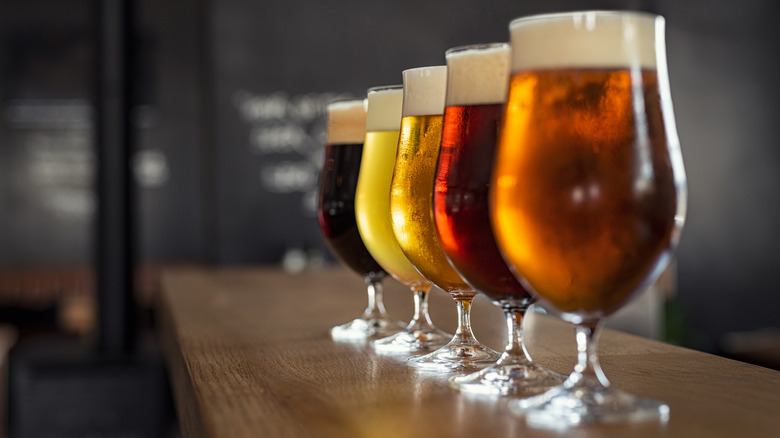Beer Or Wine: Which Has More Calories?
Whether it's the number of drinks, your libation of choice, or the munchies that come soon after a night out, alcohol can be problematic for your waistline. When trying to stick with your diet while enjoying a night out, you may be wondering if beer or wine is a healthier choice.
Unfortunately, it is difficult to discern a general rule of if beer or wine is healthier, as calorie content varies depending on the beer or wine product. Beer and wine have a similar calorie-count, but vary in other nutritional elements. A lighter beer can be between 60 and 120 calories with lower alcohol content, while a darker beer is heavier, and can contain up to 300 calories, and have more carbohydrates (via Livestrong). Meanwhile, both red and white wine have between 120 and 210 calories per six ounce glass. Just like beer, there is some variety in calories when comparing a heavier wine to a lighter wine.
Health experts point out there are other considerations to take into account when selecting beer or wine. Carbohydrates largely contribute to the calorie count in these drinks. In fact, brewers add an additional enzyme during the brewing or fermentation process to break down starch molecules into simple sugars, cutting the remaining carbs and keeping the alcohol content low (via CNN).
Always discuss alcohol consumption with your doctor
While wine has a lower carbohydrate count than beer, in many cases, it can contain more sugar than beer. But some studies have also shown red wine's polyphenol compounds like resveratrol can have long-term cardiovascular benefits and potentially prevent cancer, according to Livestrong.
A possible health perk for beer is that it contains more nutritional benefits like protein, fiber, selenium, vitamin B, phosphorus, folate and niacin than wine (via NPR). Preliminary research also found that beer contains antioxidants similar to wine, along with prebiotics that could be beneficial to your gut health. But remember, while alcohol in moderation is okay for some people, those with certain health conditions should refrain from drinking. And in general, it's best to discuss alcohol consumption with your doctor, as some large studies do show there are more risks involved with drinking than benefits.
If calories are your main focus, you may want to stick with a spirit like vodka or rum, but be mindful of your mixers. Those delicious cocktails with fruit juice or soda can pack some big calorie counts. If you have your heart set on beer or wine, opt for a light beer or a reduced-calorie wine. Most importantly, enjoy your drink of choice in moderation — that means 2 or less per day for men and 1 or less per day for women, according to guidelines from the Centers for Disease Control and Prevention.


